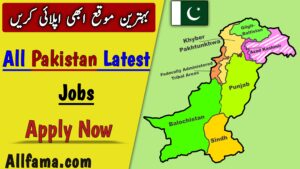Jobs are the lifeblood of any economy, serving as the foundation for individual livelihoods and the overall prosperity of a nation. In Pakistan, a country with a population of over 220 million people, the job market plays a pivotal role in shaping the lives of its citizens and the trajectory of its economy.
Jobs in Pakistan
This article explores the state of jobs in Pakistan, highlighting the challenges, opportunities, and emerging trends in the country’s job market.
Challenges in the Job Market
Unemployment: One of the most pressing challenges in Pakistan is unemployment. The country faces a high rate of joblessness, especially among its youth. According to data from the Pakistan Bureau of Statistics, the unemployment rate in Pakistan stood at 5.8% in 2020. However, this figure does not account for the underemployed and those who have given up looking for work, painting a more bleak picture of the job market.
Skill Mismatch: There is often a disconnect between the skills possessed by the workforce and the skills demanded by employers. Many graduates struggle to find jobs that align with their qualifications, leading to frustration and wasted potential.
Informal Economy: A significant portion of the Pakistani workforce is engaged in the informal sector, which lacks job security, benefits, and legal protections. These workers often face exploitative conditions and have limited access to social safety nets.
Gender Disparities: Gender disparities persist in the job market, with women facing numerous barriers to employment, including cultural norms, limited access to education, and workplace discrimination.
Opportunities in the Job Market
Agriculture: Agriculture remains a crucial sector in Pakistan, employing a significant portion of the population. There is potential for growth and job creation in this sector through modernization, improved farming practices, and value addition.
Information Technology (IT): Pakistan’s IT industry has been steadily growing and has the potential to become a major player in the global tech market. With a young and tech-savvy workforce, Pakistan can tap into the IT sector to create high-paying jobs and boost exports.

Jobs in Dubai UAE
Manufacturing: The manufacturing sector has significant potential for job creation. Investments in industries such as textiles, automotive, and electronics can lead to increased employment opportunities.
Entrepreneurship: The entrepreneurial ecosystem in Pakistan has been flourishing, with startups and small businesses emerging in various sectors. Government initiatives and private sector support for entrepreneurs can foster job creation.
Emerging Trends in the Job Market
Remote Work: This trend is likely to continue as companies realize the benefits of remote and flexible work arrangements. It opens up job opportunities for individuals outside major urban centers and can reduce congestion and pollution in cities.
E-commerce: The growth of e-commerce platforms has created jobs in logistics, digital marketing, and customer service. As more consumers turn to online shopping, this trend is expected to drive job growth in the digital economy.
Green Jobs: With increasing environmental concerns, there is a growing demand for green jobs in sectors like renewable energy, sustainable agriculture, and environmental conservation. Pakistan can leverage its natural resources for job creation in these fields.
Skills Development: Recognizing the skill gap, there is a growing emphasis on skills development programs. Government and private initiatives are offering training and certification programs to bridge the gap between job seekers’ skills and employers’ requirements.
Government Initiatives
The Pakistani government has taken several initiatives to address the challenges in the job market and promote employment opportunities:
Kamyab Jawan Program: This program aims to empower the youth by providing them with financial support and entrepreneurship opportunities.
Ehsaas Program: The Ehsaas program focuses on poverty alleviation and includes initiatives to support jobless individuals and provide them with skills training.
Special Economic Zones (SEZs): The government has established SEZs to attract foreign investment and promote industrialization, which can lead to job creation.
Tech-based Incubators: Various technology incubators and accelerators have been set up to support startups and promote innovation.
The job market in Pakistan is beset with challenges, but it also presents numerous opportunities for growth and development. Addressing issues such as unemployment, skill mismatch, and gender disparities will require concerted efforts from the government, private sector, and civil society. The emergence of new trends, such as remote work and e-commerce, offers hope for job seekers and can contribute to a more inclusive and dynamic job market in the future. By investing in education, skills development, and entrepreneurship, Pakistan can harness the potential of its youthful population and build a stronger and more resilient economy.



